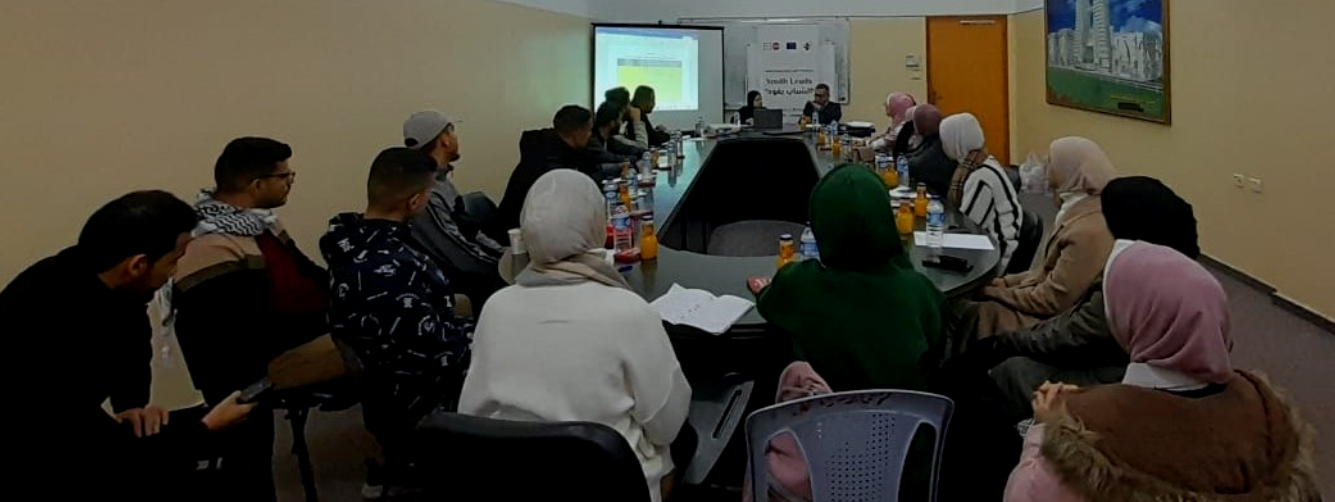Ramallah – 16/2/2022 – Last week, MIFTAH, in cooperation with the Tubas Charitable Center and “Al Najda” Center in Tulkarm, capped off training on monitoring and documenting Israeli human rights violations, with a focus on the oppressive and violent measures against Palestinian women. The training was attended by 29 participants from four northern districts: Jenin, Qalqilya, Tubas and Tulkarm.
This program is part of MIFTAH’s strategic approaches to support and empower women and youth leaders to be more involved in public affairs, including issues associated to women’s political participation and gender-based violence. The training was part of an EU-funded project “Working together as Agents for Change: Towards the Protection and Promotion of Women’s Human Rights”, which MIFTAH implements in partnership with the Women’s Center for Legal Aid and Counseling (WCLAC).
The project sheds light on the challenges faced by women and girls in accessing services and on violence against them, including daily violations by the Israeli occupation, especially in marginalized areas in the Jenin, Tulkarm, Qalqilya and Tubas districts.
In this context, MIFTAH held a series of training workshops on the documentation of international humanitarian law violations and the use of tools it developed. The trainings targeting employees and volunteer members of local coalitions for the implementation of UNSCR1325 in the targeted districts, to update their skills and knowledge on documenting these violations, which could be used as evidence in international advocacy.
Monitoring and documentation trainer, stressed on the need to integrate monitoring and documentation within human rights work and based on international standards, given the importance of providing evidence of the violation and identifying the perpetrator and circumstance in which the violation occurred. She continued that it was also imperative to hear the story from the victims themselves through trained individuals, with a focus on objectivity, accuracy and reliability in conveying information. She said the tools developed by MIFTAH were designed to promote MIFTAH’s vision and achieve the project’s objectives of exposing the occupation authority’s measures and holding it accountable.
MIFTAH field consultant in the Tulkarm district, Nada Biddu, stressed on the importance of the training for youth, which she said was aimed at creating a generation aware of the issues related to Israeli violations against the Palestinian people. She added that the trainings build youth capacities in the field of human rights and involvement in policy dialogue through monitoring violations, honing their skills in documenting testimonies and addressing international human rights institutions in order to hold Israeli soldiers and settlers accountable.
Biddu pointed out that one of most important recommendations was to continue holding similar training workshops in the field of monitoring and documentation of Israeli human rights violations and to follow up with the relevant international parties.
On her part, women’s activist in the Tubas district, Jiana Kharraz, said the training was a golden opportunity for the participants to see the Jordan Valley and the hard life people live and to therefore support them in the face of settler attacks and violations. “We were left with major impressions and reflections from the training and the field visits to these areas,” she explained. “We were struck by what we saw and we realized that documenting violations in this unsafe environment is no easy task.”
Najat Abu Rmeileh, MIFTAH’s field consultant in the Jericho and Jordan Valley region, explained that training for young women activists in the Tubas region included filling out surveys to document the daily Israeli violations against women. She also said the Tubas region was targeted because of its daily and direct contact with the occupation, especially in the villages of Aqaba, Tayaseer, Maleh, Ras Al Ahmar and Atouf, and in the northern Jordan Valley: Kardala, Bardala, Ein Beida and Hadidiya. She said there was an urgent need to document and monitor Israeli violations by the army and settlers against Palestinian women in this region. A second goal, she maintained, was for women activists to participate in highlighting the pressing issues pertaining to Palestinian women under Israeli occupation, including military oppression, discrimination and settler violence.
It should be noted that MIFTAH works in parallel within the project “Working together as Agents for Change: Towards the Protection and Promotion of Women’s Human Rights” to also promote the capacities of women and youth in raising social awareness on their political participation, especially in local elections, by holding awareness meetings in the four northern districts of Tubas, Tulkarm, Jenin and Qalqilya.







